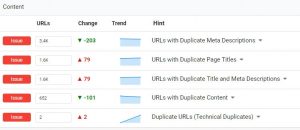by Laurie Sullivan, Staff Writer @lauriesullivan, December 14, 2016
Content relevance continues to increase as a ranking factor in Google search engine query results as backlinks decline in importance, according to a study released this week.
Searchmetrics’ annual white paper detailing Google ranking factors — which analyzes the top 20 search results for 10,000 keywords on Google.com — aims to identify key factors that high-ranking Web pages have in common, providing a benchmark for marketers.
It makes sense that backlinks have become less important as a ranking factor when considering the rise of mobile search. The study notes that “pages viewed on mobile devices are often “liked” or shared but seldom actively linked to.”
The detailed white paper, Rebooting Ranking Factors, shows that URL results with the highest content relevance scores appear in ranking positions from 3 to 6. In general, the best content relevance scores are found at the top of the page, suggesting that Google knows when content is more relevant, but this rule does not apply to results found in positions 1 and 2, which are usually reserved for top brand Web sites.
Interestingly, the number of words on higher-ranking pages continue to increase, but the number of keywords continue to decline. The top 20 results include 20% fewer matching keywords in the copy compared with 2015, and just 53% of the top 20 results have the keyword in the title, compared with 75% in 2015. Less than 40% now have the matching keyword in H1 title tag used in the HTML of Web pages to tell search engines what the page is about.
The average Bounce Rate — which measures the percentage of users who only click on the URL from Google’s search results — on the first page of search results is 46%, up from 37% in 2014, per the findings.
Searchmetrics’ analysis attributes this to an increase in Google directing users straight to the specific URL with precise information, which means the searcher has no need to delve deeper into a domain.
This is supported by the large increase in average Time on Site, which Searchmetrics estimates sits at 190 seconds on the top-ranking URLs and 160 seconds for all URLs.
Nearly half the Web pages in the top 10 now use HTTPS encryption, up from 12% in 2015. The white paper also reminds marketers that those pages that have not switched to HTTPS by 2017 will be marked “unsafe” in its Chrome browser.
The white paper also details top level domain names, site speed, and URL length.
MediaPost.com: Search Marketing Daily
(72)
Report Post







